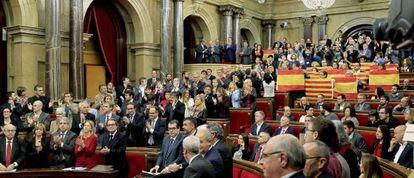Fitch downgrades Catalonia to “junk” status following separatist motion
Move caused by the tension between Madrid and Barcelona, which is likely to increase

The Catalan government’s decision to press ahead with its breakaway from Spain is already having an economic impact.
On Thursday, the ratings agency Fitch announced it was downgrading Catalonia’s debt rating to what is colloquially known as “junk” status.
The decision to take down the grade from BBB- to BB is based on the growing standoff between Madrid and Barcelona over the separatist motion passed on Monday by the secessionist majority in the Catalan parliament.
Despite the lack of cooperation so far, CUP leaders do not wish to hold new elections in March
“Whatever measures the central government decides to adopt, it is likely to result in increased tensions between the two governments and possible civil disruption in the region,” said the agency in a statement.
“Fitch will continue to monitor developments in Catalonia and may take further negative rating action as appropriate,” the note added, although Fitch conceded that “the independence process will not interrupt economic activity” in the region.
This is not the first time that a ratings agency has reduced Catalan bonds to junk status – Standard & Poor’s did so in October. But this is the first economic reaction following the approval of the “disconnect” from Spain.
But the tension between Madrid and Barcelona is not likely to let up any time soon. On Thursday, a fringe anti-capitalist party that holds the key to power in the region following the September 27 election issued a list of demands.
If the CUP’s requests for “independence, zero poverty and no more corruption” are not met to their satisfaction, they could continue to withhold the support that Mas needs to continue leading Catalonia.
After failing to back him at two investiture votes this week, the CUP has pushed the process into a two-month period that will result in fresh elections if no agreement is reached.
The far-left group would rather see somebody else in the premiership, as it considers Mas and his Democratic Convergence of Catalonia (CDC) to represent corruption and social cuts. So far, Mas has refused to step aside.

The CUP is setting down an 18-month deadline to work on the creation of a new republic – a process that began with Monday’s separatist motion. The next step is the creation of “a breakaway calendar.”
The group’s demands also include the right to self-determination of “the Catalan countries,” a term used by secessionists that encompasses not just Catalonia but also nearby areas with historic ties to Catalan culture, including the Valencian region, the Balearic Islands and parts of southern France. In fact, leaders will first consult with affiliated groups in Valencia, Palma de Mallorca and even the French city of Perpignan before officially voting for any candidate to the Catalan premiership.
The party also lists 39 social measures to be implemented immediately, such as a minimum income for all residents, housing policies to ensure that borrowers in default are not left homeless, and guaranteed utilities for the lowest earners.
Despite its lack of cooperation so far, CUP leaders said they have “no intention of walking away from the negotiating table at any time,” and do not wish to hold new elections in March.
English version by Susana Urra.










































